四级听力 大学英语四级听力方法Tapescripts
英语四级听力技巧
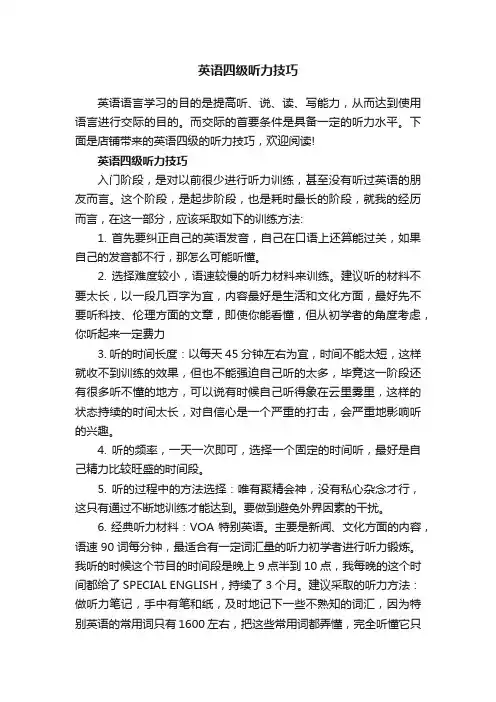
英语四级听力技巧英语语言学习的目的是提高听、说、读、写能力,从而达到使用语言进行交际的目的。
而交际的首要条件是具备一定的听力水平。
下面是店铺带来的英语四级的听力技巧,欢迎阅读!英语四级听力技巧入门阶段,是对以前很少进行听力训练,甚至没有听过英语的朋友而言。
这个阶段,是起步阶段,也是耗时最长的阶段,就我的经历而言,在这一部分,应该采取如下的训练方法:1. 首先要纠正自己的英语发音,自己在口语上还算能过关,如果自己的发音都不行,那怎么可能听懂。
2. 选择难度较小,语速较慢的听力材料来训练。
建议听的材料不要太长,以一段几百字为宜,内容最好是生活和文化方面,最好先不要听科技、伦理方面的文章,即使你能看懂,但从初学者的角度考虑,你听起来一定费力3. 听的时间长度:以每天45分钟左右为宜,时间不能太短,这样就收不到训练的效果,但也不能强迫自己听的太多,毕竟这一阶段还有很多听不懂的地方,可以说有时候自己听得象在云里雾里,这样的状态持续的时间太长,对自信心是一个严重的打击,会严重地影响听的兴趣。
4. 听的频率,一天一次即可,选择一个固定的时间听,最好是自己精力比较旺盛的时间段。
5. 听的过程中的方法选择:唯有聚精会神,没有私心杂念才行,这只有通过不断地训练才能达到。
要做到避免外界因素的干扰。
6. 经典听力材料:VOA 特别英语。
主要是新闻、文化方面的内容,语速90词每分钟,最适合有一定词汇量的听力初学者进行听力锻炼。
我听的时候这个节目的时间段是晚上9点半到10点,我每晚的这个时间都给了SPECIAL ENGLISH,持续了3个月。
建议采取的听力方法:做听力笔记,手中有笔和纸,及时地记下一些不熟知的词汇,因为特别英语的常用词只有1600左右,把这些常用词都弄懂,完全听懂它只是一个时间问题。
备注:这一阶段最重要,一定需要耐心和毅力,如果读写基础还行的话,应该能在2、3个月之内完成这个过程,进入攻坚阶段。
掌握了一定的备考方法之后,也要具备一定的答题技巧,下面小编就教大家几招。
大学英语四级听力技巧

一、如何准备考试
(一)熟悉四大题型,攻克薄弱环节
(二)了解测试程序,树立正确心态
考场指令:120秒
题目间歇:15秒
对话:55秒
短文:35秒
听写:60秒
二、考生的薄弱环节
1、词汇量不够 2、语音不过关 3、长句听不懂 4、听力训练面太窄 5、记忆力不强 6、语感差、常识少 7、心理素质差
三、如何提高听力能力
1、背熟四级词汇 2、用精听训练扎实基本功 3、用泛听拓展知识背景
四、短对话
题型分类 1、释义题(习语、短语) 2、细节题(事件、虚拟语气、弦外之音) 3、态度题 4、建议题 5、关系、身份题 6、场所题 7、数字题
五、长对话
解题步骤 1、浏览选项、预测问题 2、掌握出题规律 3、探寻出题思路、了解对话主题 4、训练记笔记能力
六、听短文
应试策略 1、浏览选项、猜测文章大意 2、出题顺序与短文顺序一致 3、原则:听到什么选什么、同义表达
七、复合式听写
应试策略 1、预读---掌握先机,化被动为主动 2、首遍听---以听为主,深化理解 3、次遍听---胸有成竹、填缺补漏 4、末遍听---掌握通篇、注重细节 5、听后检查
英语四级听力技巧汇总
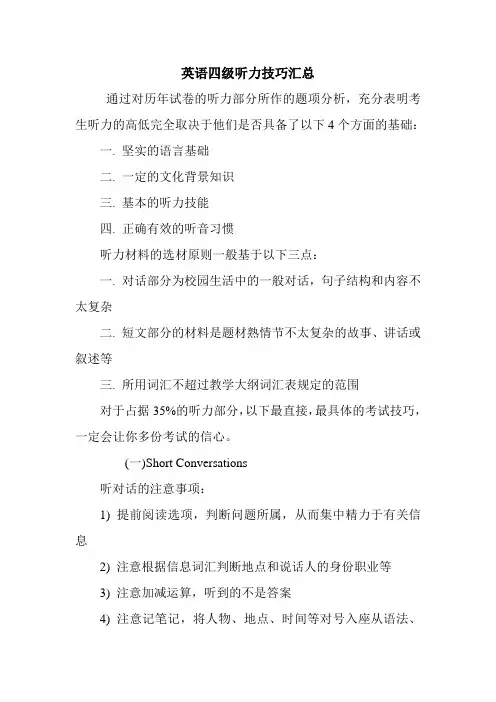
英语四级听力技巧汇总通过对历年试卷的听力部分所作的题项分析,充分表明考生听力的高低完全取决于他们是否具备了以下4个方面的基础:一. 坚实的语言基础二. 一定的文化背景知识三. 基本的听力技能四. 正确有效的听音习惯听力材料的选材原则一般基于以下三点:一. 对话部分为校园生活中的一般对话,句子结构和内容不太复杂二. 短文部分的材料是题材熟情节不太复杂的故事、讲话或叙述等三. 所用词汇不超过教学大纲词汇表规定的范围对于占据35%的听力部分,以下最直接,最具体的考试技巧,一定会让你多份考试的信心。
(一)Short Conversations听对话的注意事项:1) 提前阅读选项,判断问题所属,从而集中精力于有关信息2) 注意根据信息词汇判断地点和说话人的身份职业等3) 注意加减运算,听到的不是答案4) 注意记笔记,将人物、地点、时间等对号入座从语法、短语含义入手,判断隐含之意题目序号:11-18及格数量:5-6道推荐准确数量:6-7题重点场景:Airport(flight),restaurant hotel重点主题:Campus life,job-hutting核心技巧:1、后句比前句重要,回答比提问重要2、若选项中个别单词或短语被明显播读,此项多为错项3、最好能够听懂问题在问什么例题:2006年6月四级考试第9题A.Helen is talkativeB. Helen is activeC. Helen is sociableD. Helen is quite原文:M:Weve got three women researchers in our group, Mary, Betty and Helen. Do you know them?W: Sure, Mary is active and sociable. Betty is the most talkative woman Ive ever met. But guess what?Helen is just the opposite.Q: what do we know from the conversation?解析:可以明显看出,本题的答案为D.其中,另外三项的形容词都被读到,而quite恰好是talkative与opposite组合的一个同义替换。
英语四级听力技巧
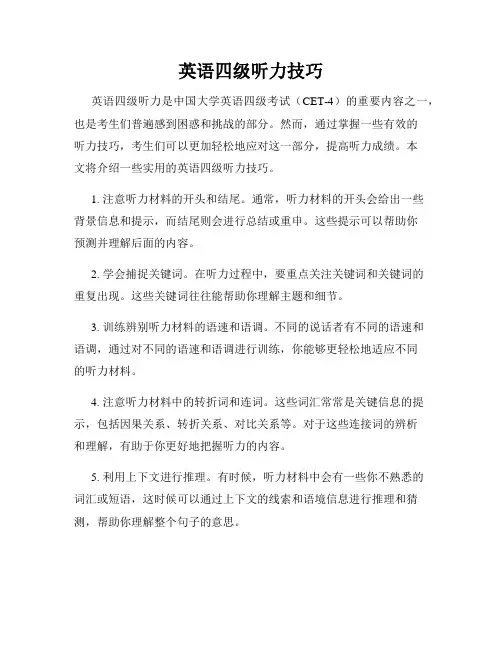
英语四级听力技巧英语四级听力是中国大学英语四级考试(CET-4)的重要内容之一,也是考生们普遍感到困惑和挑战的部分。
然而,通过掌握一些有效的听力技巧,考生们可以更加轻松地应对这一部分,提高听力成绩。
本文将介绍一些实用的英语四级听力技巧。
1. 注意听力材料的开头和结尾。
通常,听力材料的开头会给出一些背景信息和提示,而结尾则会进行总结或重申。
这些提示可以帮助你预测并理解后面的内容。
2. 学会捕捉关键词。
在听力过程中,要重点关注关键词和关键词的重复出现。
这些关键词往往能帮助你理解主题和细节。
3. 训练辨别听力材料的语速和语调。
不同的说话者有不同的语速和语调,通过对不同的语速和语调进行训练,你能够更轻松地适应不同的听力材料。
4. 注意听力材料中的转折词和连词。
这些词汇常常是关键信息的提示,包括因果关系、转折关系、对比关系等。
对于这些连接词的辨析和理解,有助于你更好地把握听力的内容。
5. 利用上下文进行推理。
有时候,听力材料中会有一些你不熟悉的词汇或短语,这时候可以通过上下文的线索和语境信息进行推理和猜测,帮助你理解整个句子的意思。
6. 训练记笔记的技巧。
在听力过程中,可以适当使用记笔记的方式来记录关键信息,包括数字、日期、名字、地点等。
这样可以帮助你在听完后更好地回答问题或理解听力材料的内容。
7. 练习多种题型。
英语四级听力考试涵盖了多种题型,包括选择题、填空题、匹配题等。
在备考过程中,要多做各种类型的练习题,熟悉不同题型的要求和答题技巧。
8. 提高听力素材的接触频率。
练习听力需要通过多听、多练来提高。
可以利用各种资源,如英语电台、英语专辑、英语新闻等来提高听力素材的接触频率,增加听力的曝光量。
9. 注意细节和上下文的关系。
在听力材料中,细节与上下文的关系密切相关。
细节信息通常与上下文的发展和主题相关联,通过把握上下文的关系,可以更好地理解细节信息。
10. 练习听力材料的听写和复述。
听写和复述是有效的听力训练方式,可以帮助你提高听力的准确度和连贯度。
大学英语四级听力的技巧
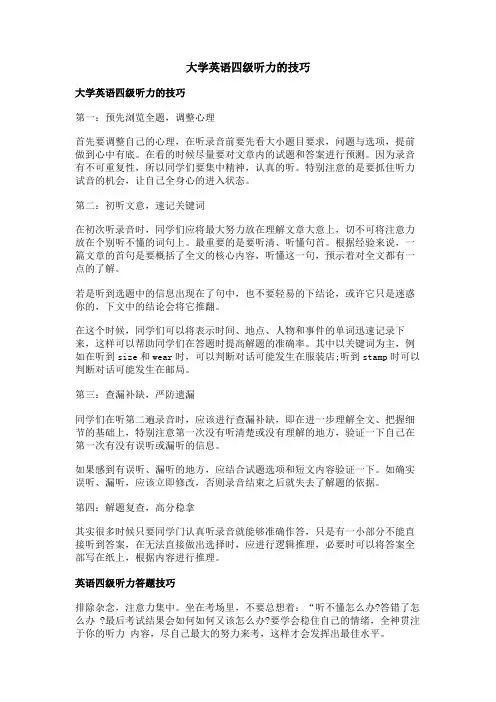
大学英语四级听力的技巧大学英语四级听力的技巧第一:预先浏览全题,调整心理首先要调整自己的心理,在听录音前要先看大小题目要求,问题与选项,提前做到心中有底。
在看的时候尽量要对文章内的试题和答案进行预测。
因为录音有不可重复性,所以同学们要集中精神,认真的听。
特别注意的是要抓住听力试音的机会,让自己全身心的进入状态。
第二:初听文意,速记关键词在初次听录音时,同学们应将最大努力放在理解文章大意上,切不可将注意力放在个别听不懂的词句上。
最重要的是要听清、听懂句首。
根据经验来说,一篇文章的首句是要概括了全文的核心内容,听懂这一句,预示着对全文都有一点的了解。
若是听到选题中的信息出现在了句中,也不要轻易的下结论,或许它只是迷惑你的,下文中的结论会将它推翻。
在这个时候,同学们可以将表示时间、地点、人物和事件的单词迅速记录下来,这样可以帮助同学们在答题时提高解题的准确率。
其中以关键词为主,例如在听到size和wear时,可以判断对话可能发生在服装店;听到stamp时可以判断对话可能发生在邮局。
第三:查漏补缺,严防遗漏同学们在听第二遍录音时,应该进行查漏补缺,即在进一步理解全文、把握细节的基础上,特别注意第一次没有听清楚或没有理解的地方,验证一下自己在第一次有没有误听或漏听的信息。
如果感到有误听、漏听的地方,应结合试题选项和短文内容验证一下。
如确实误听、漏听,应该立即修改,否则录音结束之后就失去了解题的依据。
第四:解题复查,高分稳拿其实很多时候只要同学门认真听录音就能够准确作答,只是有一小部分不能直接听到答案,在无法直接做出选择时,应进行逻辑推理,必要时可以将答案全部写在纸上,根据内容进行推理。
英语四级听力答题技巧排除杂念,注意力集中。
坐在考场里,不要总想着:“听不懂怎么办?答错了怎么办 ?最后考试结果会如何如何又该怎么办?要学会稳住自己的情绪,全神贯注于你的听力内容,尽自己最大的努力来考,这样才会发挥出最佳水平。
英语四级听力技巧和方法
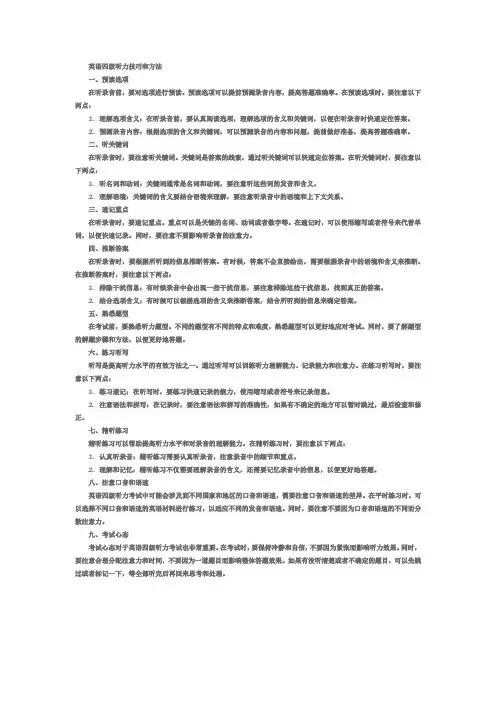
英语四级听力技巧和方法一、预读选项在听录音前,要对选项进行预读。
预读选项可以提前预测录音内容,提高答题准确率。
在预读选项时,要注意以下两点:1. 理解选项含义:在听录音前,要认真阅读选项,理解选项的含义和关键词,以便在听录音时快速定位答案。
2. 预测录音内容:根据选项的含义和关键词,可以预测录音的内容和问题,提前做好准备,提高答题准确率。
二、听关键词在听录音时,要注意听关键词。
关键词是答案的线索,通过听关键词可以快速定位答案。
在听关键词时,要注意以下两点:1. 听名词和动词:关键词通常是名词和动词,要注意听这些词的发音和含义。
2. 理解语境:关键词的含义要结合语境来理解,要注意听录音中的语境和上下文关系。
三、速记重点在听录音时,要速记重点。
重点可以是关键的名词、动词或者数字等。
在速记时,可以使用缩写或者符号来代替单词,以便快速记录。
同时,要注意不要影响听录音的注意力。
四、推断答案在听录音时,要根据所听到的信息推断答案。
有时候,答案不会直接给出,需要根据录音中的语境和含义来推断。
在推断答案时,要注意以下两点:1. 排除干扰信息:有时候录音中会出现一些干扰信息,要注意排除这些干扰信息,找到真正的答案。
2. 结合选项含义:有时候可以根据选项的含义来推断答案,结合所听到的信息来确定答案。
五、熟悉题型在考试前,要熟悉听力题型。
不同的题型有不同的特点和难度,熟悉题型可以更好地应对考试。
同时,要了解题型的解题步骤和方法,以便更好地答题。
六、练习听写听写是提高听力水平的有效方法之一。
通过听写可以训练听力理解能力、记录能力和注意力。
在练习听写时,要注意以下两点:1. 练习速记:在听写时,要练习快速记录的能力,使用缩写或者符号来记录信息。
2. 注意语法和拼写:在记录时,要注意语法和拼写的准确性,如果有不确定的地方可以暂时跳过,最后检查和修正。
七、精听练习精听练习可以帮助提高听力水平和对录音的理解能力。
在精听练习时,要注意以下两点:1. 认真听录音:精听练习需要认真听录音,注意录音中的细节和重点。
大学英语四级考试各类题型全面指导
英语四级各类题型考试全面指导I.Listening Comprehension (听力理解)大学英语四级考试的听力试题分为两个部分,包括四种题型:简短对话、短文、听写填空和复合式听写。
听力试题作为整个考试的第一部分,答得好坏对考试成绩会有较大的影响。
因此,首先要能够合理地分配时间,掌握好题目之间的时间间隔,从而做到有条不紊。
根据考试大纲规定,对话和短文部分每题题目之间的停顿大约在15秒左右。
听写填空的停顿时间为所要求听写的单词字母数乘以0.8秒。
其次,在做题的过程中,要能够根据不同的题型,采用适当的方法,从而提高答题的正确率。
(1) Short Conversations (简短对话)做这一部分题目时,应在听录音之前抓紧时间事先看一遍题目,尤其是选择项,并依此判断出可能要提出的问题,以便在听的过程中更有针对性。
例如,当看到四个选择项分别为:A) At the bank.B) In the office.C) At home.D) In a hotel.时,就应该判断出这一题的问题是关于地点的。
所以在听的过程中,只要注意和以上地点有关的词语,就会得出正确的选择。
当然想在考试中熟练地做到这一点,则需要平时反复大量的练习,并且对这一部分试题进行分类、归纳,总结出规律性的东西,才能够做到八九不离十。
(2) Passages (短文理解题)这部分中,做题的正确率不仅取决于听力本身,还可能涉及到文章的背景知识;文化习俗等诸多因素。
做这一部分题目时,应当注意从两方面入手:一是抓大意,二是抓具体细节。
可能会出现这种情况,文章没怎么听懂,但其中的某个人名、地点或者数字抓到了,题目就可以做对。
因此,做题时要做到耳、眼、手、脑同时并用。
也就是说,一边听录音,一边看选择项,一边适当地做些记号。
一般来讲,三篇短文中有关细节的题目大约都有四、五道题。
(3) Spot Dictation (听写填空)这是一种新题型。
这种题型是将一篇120词左右的短文,朗读三遍。
四级听力技巧和方法
四级听力技巧和方法
四级听力是大学英语四级考试的一项重要内容,要求考生能够听懂日
常用语和常见专业术语的交流对话,并能够根据听力内容回答相关问题。
以下是四级听力技巧和方法:
1.提前了解话题。
在听力考试之前,可以提前了解一些考试涉及的话题,比如教育、科技、环保等。
在考试时,听到相关关键词时,就能更好地理解和预测接下
来的内容。
2.注意听力材料的语速和语调。
图书馆、电视台等场景中的口音、发音、语速、语调等也是听力考试
的关键因素。
考生应该做好听力前的准备,训练自己对不同口音和发音的
敏感度。
3.做好笔记。
在听力时,应该尽量记录笔记,比如听到重点词汇、关键句子、数字
等内容。
这样可以帮助自己回忆一些细节,帮助自己更好地回答问题。
4.做题时按照顺序。
在听完材料后,应该先看看题目的顺序,确保自己了解题目的要求和
内容。
然后再开始回答第一个问题,在完成每个问题后再进行下一个问题,确保回答正确。
5.掌握一些听力技巧。
在实际考试中,考生可以掌握一些听力技巧,比如通过上下文分析单词的意思、抓住关键词汇、注意排除干扰信息和听到问题关键词后,直接跳到相应的听力内容中等。
6.注重练习和提高听力水平。
为了在四级听力考试中取得好成绩,考生需要进行大量的练习和提升听力水平,可以通过听录音、听新闻、听专业录音等方式进行,即使是日常生活中也应该多交流和练习英语口语。
总之,四级听力考试需要掌握一定的技巧和方法。
考生可以通过充分的准备和实际操作来提高自己的听力水平,从而取得好成绩。
大学英语四级听力技巧
大学英语四级听力技巧大学英语四级考试对于很多同学来说是一个重要的关卡,而听力部分往往是不少人的“拦路虎”。
想要在四级听力中取得好成绩,掌握一些实用的技巧是必不可少的。
首先,在考试前做好充分的准备工作至关重要。
要提前熟悉四级听力的考试题型和要求。
了解常见的话题类型,比如教育、科技、文化、生活等,这样在听到相关内容时能更快地进入状态。
多听多练是提高听力水平的基础。
可以通过听历年的四级真题听力来熟悉语速、语调以及出题方式。
在练习时,建议模拟考试环境,按照规定的时间完成听力练习,以培养自己在有限时间内集中注意力的能力。
在平时的练习中,要养成精听和泛听相结合的习惯。
精听就是对一段听力材料反复听,直到完全听懂每一个单词和句子。
可以选择一些简短但有一定难度的材料,听一句暂停一下,把听到的内容写下来,没听懂的地方反复听,直到听明白为止。
泛听则是广泛地听各种英语材料,如英语新闻、电影、电视剧、广播等。
泛听的目的是培养语感,熟悉英语的语音语调。
掌握一些听力技巧也能帮助我们在考试中更好地应对。
在听力开始前,要利用好读题时间快速浏览选项,通过选项大致推测听力的主题和内容。
注意选项中的关键词,比如人名、地名、数字、时间等,这些往往是听力中容易设置考点的地方。
在听的过程中,要学会抓重点。
通常情况下,开头和结尾部分是比较重要的,很可能包含关键信息。
同时,要注意一些转折词,如 but、however 等,后面的内容往往是重点。
如果没听清某个单词或句子,不要一直纠结,继续往下听,以免错过后面更重要的信息。
另外,做好笔记也是很有必要的。
可以用一些简单的符号和缩写来记录关键信息,比如用“↑”表示上升,“↓”表示下降,“$”表示钱等。
但要注意不要因为记笔记而忽略了听的内容。
对于听力中出现的长对话和短文理解,要注意整体把握。
理解对话或文章的主旨大意,抓住主要人物的观点和态度。
对于细节题,可以根据听到的内容和之前做的笔记进行选择。
还有一点容易被忽视的是心态问题。
英语四级听力训练方法
英语四级听力训练方法推荐文章•大学英语新四级考试听力训练及答案热度:•如何提升英语四级听力方法_英语四级听力练习方法热度:•提高英语听力最快速的方法热度:•英语四级听力练习方法热度:•学习英语听力有什么好方法热度:英语四级听力训练方法以下是小编整理的英语四级听力训练方法,希望对大家英语学习有帮助。
在英语四级的考试中,听力考试是非常关键的一部分。
我们在下面的文章中,就为大家介绍了英语四级听力训练的四点方法介绍,希望能提升大家英语四级听力考试部分的成绩。
1. 播放Directions部分时,目的是让学生熟悉做题要求。
在Directions部分快要结束的时候,及时将注意力转回文章开头,做好听写准备。
2. 听第一遍录音。
目的是让考生对所听的短文有一个大致的了解,把握文章大意。
3. 听第二遍录音。
静听并做题,考生应利用空格后的停顿时间,一边听录音,一边看文字材料,重点在空格部分,力争听懂空格处是一个短语还是一个句子,为第二遍听录音、写内容打好基础。
4. 听第二遍录音。
提供考生了一次检查修改的机会。
备考大学英语四级考试的过程中进行大学英语四级听力训练是很必要的,当然考生在进行大学英语四级听力训练时需要避免一些错误的训练方法。
下面就和各位考生详细的谈一谈大学英语四级听力训练时中的常见错误训练方法。
1、很多考生在进行大学英语四级听力训练时不愿对着文字材料大声朗读,认为听力就是听力,没有必要和朗读口语联系起来。
其实听力考的是口头语言,口语提高了,听力也就自然而然上去了。
同时朗读可以培养正确的语音语调,可以加强我们对文章的领悟力。
2、鸵鸟式听法。
很多同学在做大学英语四级听力训练时没有动手的习惯,听就是听,在做题时才努力回忆与该题有关的信息。
甚至有同学喜欢闭着眼睛听或者把头低下来,伏在桌子上听,并认为这样注意力更集中,但这样往往容易走神,听的效率非常低。
3、多而不精。
对于已经听过的材料,很多同学都很少再听,这是一个错误的观念。
- 1、下载文档前请自行甄别文档内容的完整性,平台不提供额外的编辑、内容补充、找答案等附加服务。
- 2、"仅部分预览"的文档,不可在线预览部分如存在完整性等问题,可反馈申请退款(可完整预览的文档不适用该条件!)。
- 3、如文档侵犯您的权益,请联系客服反馈,我们会尽快为您处理(人工客服工作时间:9:00-18:30)。
Section A11.M: Shawn's been trying for months to find a job. But I wonder how he could get a job when he looks like that.W: Oh, that poor guy! He really should shave himself every other day at least and put on something clean.Q: What do we learn about Shawn?12.W: I wish Jane would call when she know she'll be late. This is not the first time we've had to wait for her.M: I agree. But she does have to drive through very heavy traffic to get here.Q: What does the man imply?13.M: Congratulations! I heard your baseball team is going to the Middle Atlantic Championship. W: Yeah, we're all working real hard right now!Q: What is the woman's team doing?14.W: John's been looking after his mother in the hospital. She was injured in a car accident two weeks ago and still in critical condition.W:Oh, that's terrible. And you know his father passed away last year.Q: What do we learn about John?15.M: What a boring speaker! I could hardly stay awake.W: Well, I don't know. In fact, I think it's been a long time since I've heard anyone is good.Q: What do we learn from the conversation?16.W: I'm having a lot of trouble with logic and it seems my professor can't explain it in a way that makes sense to me.M: Y ou know, there is a tutoring service on campus. I was about to drop statistics before they helped me out.Q: What does the man mean?17.M: This is a stylish overcoat. I saw you wearing it last week, did't I ?W: Oh, that wasn't me. That was my sister Jill. She's in your class.Q: What does the woman mean?18.M: Jane, suppose you lost all your money while taking a vacation overseas, what would you do?W: Well, I guess I'd sell my watch or computer or do some odd jobs till I could afford a return plane ticket.Q: What are the speakers talking about?Conversation OneM: Hello, Professor Johnson.W: Hello, Tony, so what shall we work on today?M: Well, the problem is that this writing assignment isn’t coming out right. What I thought I was writing on was to talk about what a particular sport means to me when I participate in.W: What sport did you choose?M: I decided to write about cross-country skiing.W: What are you going to say about skiing?M: That’s the problem. I thought I would write about how peaceful it is to be out in the country. W: So why is that a problem?M: I’d like to sta rt describing how quite it is to be out in the woods. I keep mentioning how much effort it takes to keep going. Cross-country skiing isn’t as easy as some people think. It takes a lot of energy, but that’s not heart of my paper, so I guess I should leave it out. But now I don’t know how to explain that feeling of peacefulness without explaining how hard you have to work for it. It all fits together. It’s not like just sitting down somewhere and watching the clouds roll by. That’s different.W: Then you have to include that in your point. The peacefulness of cross-country skiing is the kind you earn by effort. Why leave that out? Part of your point you knew beforehand, but part you discovered as you wrote. That’s common, right?M: Y eah, I guess so.Q19. What is the topic of the man’s writing assignment?Q20. What problem does the man have while working on his paper?Q21. What does the woman say is common in writing papers?Conversation TwoW: Good evening and welcome to this week's Business World. A program for and about business people. Tonight we have Mr. Angeleno who came to the US six years ago, and is now an established businessman with three restaurants in town. Tell us Mr. Angeleno, how did you get started?M: Well I started off with a small diner. I did all the cooking myself and my wife waited on tables. It was really too much work for two people. My cooking is great. And word got around town about the food. Within a year, I had to hire another cook and four waitresses. When that restaurant became very busy, I decided to expand my business. Now with three places my main concern is keeping the business successful and running smoothly.W: Do you advertise?M: Oh yes. I don't have any TV commercials, because they are too expensive. But I advertise a lot on radio and in local newspapers. My children used to distribute ads. in nearby shopping centres, but we don't need to do that anymore.W: Why do you believe you've been so successful?M: Em, I always serve the freshest possible food and I make the atmosphere as comfortable and as pleasant as I can, so that my customers will want to come back.W: So you always aim to please the customers?M: Absolutely! Without them I would have no business at all.W: Thank you Mr. Angeleno. I think your advice will be helpful to those just staring out in business.Questions 23 to 25 are based on the conversation you have just heard.22 What is the woman’s occupation?23 What do we learn about Mr. Angeleno’s business at its beginning?24 What does Mr. Angeleno say about advertising his business?25 What does the man say contribute to the success of his business?Section BPassage OneThere are many commonly held beliefs about eye glasses and eyesight that are not proven facts. For instance, some people believe that wearing glasses too soon weakens the eyes. But there is no evidence to show that the structure of eyes is changed by wearing glasses at a young age. Wearing the wrong glasses, however, can prove harmful. Studies show that for adults there is no danger, but children can develop loss of vision if they have glasses inappropriate for their eyes.We have all heard some of the common myths about how eyesight gets bad. Most people believe that reading in dim light causes poor eyesight, but that is untrue. Too little light makes the eyes work harder, so they do get tired and strained. Eyestrain also results from reading a lot, reading in bed, and watching too much television. However, although eyestrain may cause some pain or headaches, it does not permanently damage eyesight. Another myth about eyes is that they can be replaced, or transferred from one person to another. There are close to one million nerve fibers that connect the eyeball to the brain, as of yet it is impossible to attach them all in a new person. Only certain parts of the eye can be replaced. But if we keep clearing up the myths and learning more about the eyes, some day a full transplant may be possible.26. What does the speaker want to tell us about eyesight?27. What do studies about wearing the wrong glasses show?28. What do we learn about eye transplanting from the talk?Passage T woWhen people care for an elderly relative, they often do not use available community services such as adult daycare centers. If the caregivers are adult children, they are more likely to use such services, especially because they often have jobs and other responsibilities. In contrast, a spouse usually the wife, is much less likely to use support services or to put the dependent person in a nursing home. Social workers discover that the wife normally tries to take care of her husband herself for as long as she can in order not to use up their life savings. Researchers have found thatcaring for the elderly can be a very positive experience. The elderly appreciated the care and attention they received. They were affectionate and cooperative. However, even when care giving is satisfying, it is hard work. Social workers and experts on aging offer caregivers and potential caregivers help when arranging for the care of an elderly relative. One consideration is to ask parents what they want before they become sick or dependent. Perhaps they prefer going into a nursing home and can select one in advance. On the other hand, they may want to live with their adult children. Caregivers must also learn to state their needs and opinions clearly and ask for help from others especially brothers and sisters. Brothers and sisters are often willing to help, but they may not know what to do29. Why are adult children more likely to use community services to help care for elderly parents?30. Why are most wives unwilling to put their dependent husbands into nursing homes?31. According to the passage, what must caregivers learn to do?Passage ThreeSince a union representative visited our company to inform us about our rights and protections. My coworkers have been worrying about health conditions and complaining about safety hazards in the workplace. Several of the employees in the computer department, for example, claim to be developing vision problems from having to stare at a video display terminal for about 7 hours a day. The supervisor of the laboratory is beginning to get headaches and dizzy spells because she says it’s dangerous to breathe some of the chemical smoke there. An X-ray technician is refusing to do her job until the firm agrees to replace its out-dated equipment. She insists that it’s exposing workers to unnecessarily high doses of radiation. She thinks that she may have to contact the Occupational Safety and Health Administration and asked that government agency to inspect the department. I’ve heard that at a factory in the area two pregnant women who were working with paint requested a transfer to a safer department, because they wanted to prevent damage to their unborn babies. The supervisor of personnel refused the request. In another firm the workers were constantly complaining about the malfunctioning heating system, but the owners was too busy or too mean to do anything about it. Finally, they all met and agree to wear ski-clothing to work the next day. The owner was too embarrassed to talk to his employees. But he had the heating system replaced right away.32 What does the talk focus on?33 What did the X-ray technician ask her company to do?34 What does the speaker say about the two pregnant women working with paint?35 Why did the workers in the firm wear ski-clothing to work?Section CContrary to the old warning that time waits for no one, time slows down when you are on the move. It also slows down more as you move faster, which means astronauts some day may survive so long in space that they would return to an Earth of the distant future. If you could move at the speed of light, your time would stand still, if you could move faster than light, your time wouldmove backward.Although no form of matter yet discovered, moves as fast as or faster than light, scientific experiments have already confirmed that accelerated motion causes a traveler’s time to be stretched. Albert Einstein predicted this in 1905, when he introduced the concept of relative time as part of his Special Theory of Relativity. A search is now under way to confirm the suspected existence of particles of matter that move at a speed greater than light. And therefore, might serve as our passports to the past. An obsession with time—saving, gaming, wasting, losing and mastering it—seems to have been part of humanity for as long as human have existed. Humanity also has been obsessed with trying to capture the meaning of time. Einstein used a definition of time for experimental purposes, as that which is measured by a clock. Thus time and time’s relativity are measurable by any hour glass, alarm clock, or atomic clock that can measure a billionth of a second.四级听力答案11. A He is careless about his appearance.12. A Jane may b e caught in a traffic jam.13. A Training for the Mi-Atlantic Championship.14. D He has b een having a hard time.15. D The woman thinks highly of the speaker.16. C The woman should seek help from the tutoring service.17. C Jill wore the overcoat last week.18. B An imaginary situation.19. D. A sport he participates in.20. D He can’t decide whether to include the effort part of sk iing.21. A New ideas come up as you write.22. D Hostess of the weekly “Business World”.23. B He and his wife did everything by themselves.24. B He advertises a lot on radio and in newspap ers.25. B The restaurant atmosphere.26. A There are man y false notions about it.27. C It can lead to the loss of vision in children.28. D It can only be p artly accomplished now.29. D They have jobs and other commitments.30. A They don’t want to use up all their life savings.31. C Be frank and seek help from others.32. A Health and safety conditions in the workplace.33. A Replace its out-d ated equipment.34. A They requested to transfer to a safer department.35. C To protest against the poor working conditions.36. survive37. distant38. backward39. discovered40. scientific41. motion42. predicted43. introduced44. that move at a speed great er than light, and therefore, might serve as our passports to the past45. seems to have been a part of humanity for as long as human h ave existed46. used a definition of time for experimental purposes, as that which is measured by a clock。
